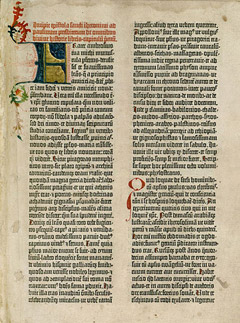First Epistle of John
 The
First Epistle of John in the New Testament is the fourth
catholic or "general" epistles. Written in Ephesus about
90-110 AD, the epistle is traditionally attributed to
the same author or authors who wrote the Gospel of John
and the other two epistles of John. Not actually a
letter, the epistle is a sermon written to counter
heresies that Jesus did not come "in the flesh," but
only as a spirit. It also defines how Christians are to
discern true teachers: by their ethics, their
proclamation of Jesus in the flesh, and by their love.
The
First Epistle of John in the New Testament is the fourth
catholic or "general" epistles. Written in Ephesus about
90-110 AD, the epistle is traditionally attributed to
the same author or authors who wrote the Gospel of John
and the other two epistles of John. Not actually a
letter, the epistle is a sermon written to counter
heresies that Jesus did not come "in the flesh," but
only as a spirit. It also defines how Christians are to
discern true teachers: by their ethics, their
proclamation of Jesus in the flesh, and by their love.
The epistle is traditionally held to have been written
by John the Evangelist, and probably also at Ephesus,
and when the writer was in advanced age. The Epistle's
content, language and conceptual style is an indication
that a common authorship existed between this letter,
the two other letters attributed to the Apostle John, as
well as the Gospel of John. Whether the author was the
Apostle John himself, someone who wrote under his name
and spoke "for him", or whether a body of authors
contributed to the writing of all four Johannine texts
is an open question. The author wrote the Epistle so
that the joy of his audience would "be full" (1.4) and
that they would "sin not" (2.1) and that "you who
believe in the name of the Son of God... may know that
you have eternal life." (5.13) It appears as though the
author was concerned about heretical teachers that had
been influencing churches under his care. Such teachers
were considered Antichrists (2.18-19) who had once been
church leaders but whose teaching became heterodox. It
appears that these teachers taught that Jesus Christ was
a Spirit being without a body (4.2), that his death on
the cross was not as an atonement for sins (1.7) and
that they were no longer able to sin (1.8-10). It
appears that John might have also been rebuking a
proto-Gnostic named Cerinthus, who also denied the
humanity of Christ.
The purpose of the author (1:1-4) is to declare the Word
of Life to those to whom he writes, in order that they
might be united in fellowship with the Father and his
Son Jesus Christ. He shows that the means of union with
God are, (1) on the part of Christ, his atoning work
(1:7; 2:2; 3:5; 4:10, 14; 5:11, 12) and his advocacy
(2:1); and (2), on the part of man, holiness (1:6),
obedience (2:3), purity (3:3), faith (3:23; 4:3; 5:5),
and love (2:7, 8; 3:14; 4:7; 5:1).
Home |
Inspiration |
Know Your Bible |
Music
Videos | Humor |
Prayer Request | Bible Help Verses

 The
First Epistle of John in the New Testament is the fourth
catholic or "general" epistles. Written in Ephesus about
90-110 AD, the epistle is traditionally attributed to
the same author or authors who wrote the Gospel of John
and the other two epistles of John. Not actually a
letter, the epistle is a sermon written to counter
heresies that Jesus did not come "in the flesh," but
only as a spirit. It also defines how Christians are to
discern true teachers: by their ethics, their
proclamation of Jesus in the flesh, and by their love.
The
First Epistle of John in the New Testament is the fourth
catholic or "general" epistles. Written in Ephesus about
90-110 AD, the epistle is traditionally attributed to
the same author or authors who wrote the Gospel of John
and the other two epistles of John. Not actually a
letter, the epistle is a sermon written to counter
heresies that Jesus did not come "in the flesh," but
only as a spirit. It also defines how Christians are to
discern true teachers: by their ethics, their
proclamation of Jesus in the flesh, and by their love.